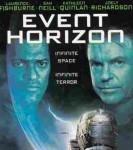
Released in 1997, Event Horizon represents a collision of genres derived from other film styles: from science fiction, horror, the action movie and war films. The otherwise predictable story – a rescue mission ship sent to recover a deep-space exploration vehicle that has reappeared after mysteriously disappearing seven years previously, and the anticipation of the various horrors that the crew will doubtless encounter aboard the stricken craft – is rescued from tired repetition precisely because it combines these genres: elements from each blending into a more engaging film.
Most science fiction films require little cerebral engagement from the audience, except perhaps an ability to marvel at the conjectured technological innovations, or at the film’s special effects. The better films, as indeed arguably all good science fiction should, set up their own world, along with its machinery, its social hierarchies and its technological evolutions, its own races and their cultures, and present it as a given, entirely credible, premise from which the film will depart. In fact, the most successful science fiction perhaps does not even attempt to amaze the viewer, or the reader, with its dazzling array of inventions: it simply gets to grips with the plot immediately, and by and large will ignore its own technology, or at least take it for granted. This makes the audience do so as well – only gradually as the film unfolds is the scale of the technological universe presented, unfolding through the demands of the narrative, and not governing it.
In this manner, the viewer accepts without consideration the premise set up by the narrative, and only marvels at it afterwards. Of course, some films demand the opposite reaction: the tired and frustratingly incompetent technology that is a feature of the first Star Wars trilogy, or the murky android flesh parlours in Blade Runner, complete with almost ever-present rain-soaked streets and citizens alike.
The structure of Event Horizon is also not presented as a straightforward sequence of events: a mysterious beginning, unexplained flashbacks, ambiguous characters towards whom the viewer’s attitudes will slowly change over the course of the film; all endeavour to subvert a traditional, organic sense of narrative progression. Total Recall also plays with the audience perception of characters and events successfully; perhaps because it is based, like Blade Runner, on a short story by the master of science-fiction, Philip K. Dick. Some elements of Event Horizon are clearly derived from the Alien series, inaugurated by Ridley Scott, later also the director of Blade Runner. The camaraderie shared by the crew of the ‘Lewis & Clark’ owes a great deal to the character-bonding in war films, while the tense build-up of expectation leading towards an unknown denouement is inherited from the horror genre.
Over the next few weeks, we’ll be exploring various themes and devices employed in the film. Next week: ‘Infinite Space, Infinite Terror: a contradiction.’
Posted by Daniel Harding, Deputy Director of Music at the University of Kent. Click here to read his Music Matters blog.
